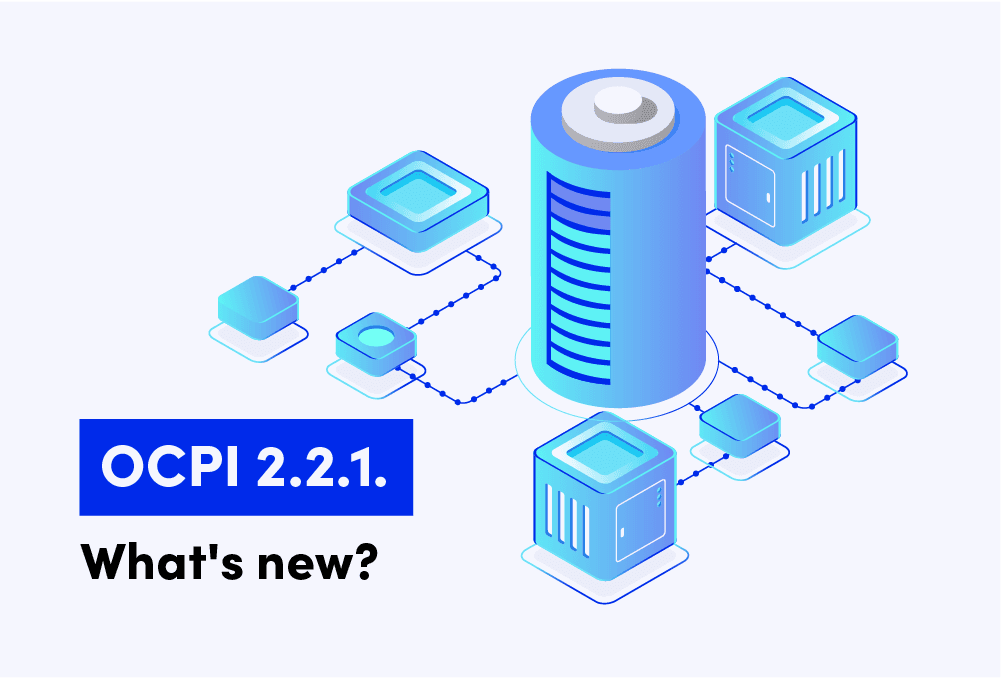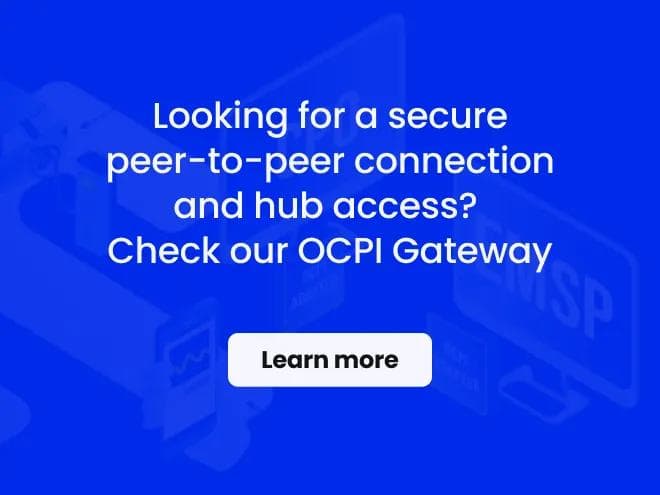Getting two charging networks to work together is never as simple as flipping a switch. Location updates, tariff changes, authorizations, live session data, and billing records must all match on both sides. When they do not, you get failed transactions, frustrated customers, and more support tickets.
OCPI gives operators a common language for exchanging this data, so you don't have to build a new integration for every partner. From 2.1.1 to 2.2, 2.2.1, and now 2.3.0, each version has fixed issues found in daily operations. With 3.0 on the way, the protocol is set to introduce features that will change roaming management.
In this article, we break down the changes in each version and explain how they affect network reliability, efficiency, and scalability.
What is OCPI?
OCPI (Open Charge Point Interface) is a standard for how different electric vehicle charging networks share data with each other. It defines a common structure to exchange information like charging station locations, tariffs, status updates, session information, and billing records.
This standardisation means that charge point operators, eMobility service providers, and roaming hubs can connect without building a new custom integration for every partnership. OCPI works for peer-to-peer connections between two networks and through roaming hubs that link multiple partners.
By using OCPI, operators can make their networks more interoperable, give drivers access to more charging points, and ensure that all parties have accurate, real-time data for authorisations, payments, and operational management.
The role of OCPI in the EV charging ecosystem
OCPI enables different charging networks to connect and share data consistently. This is key to giving EV drivers access to more charging points without adding technical complexity for operators.
For charge point operators, OCPI reduces the work involved in setting up roaming with new partners by eliminating the need for custom integrations. For e-mobility service providers, it ensures that customers can find charging stations, see live status updates, start and stop charging sessions, and pay even when using a different network.
OCPI also supports automated roaming. Through roaming hubs, multiple networks can connect so a single account works across many providers. This improves network reach for operators and gives drivers a consistent, reliable experience.
How does the OCPI protocol work?
OCPI is an API-based protocol, which means it uses defined endpoints and data formats to exchange information between different systems.
Two main connection types are supported:
- Peer-to-peer: a direct link between two parties, such as a CPO and an EMSP.
- Hub-based: both parties connect to a roaming hub, which routes messages between multiple networks.
Through these connections, OCPI exchanges:
- Token for authorising drivers
- Tariff information for pricing transparency
- Session information and session data for active and past charging sessions
- Charge Detail Records (CDRs) for billing purposes and transaction records
- Static charge point information and status information for location and availability updates
How does OCPI work in practice?
Imagine an EMSP customer (a.k.a. an EV driver) starts a charging session on a CPO’s station in another network. At the same time, OCPI passes the token to authorise the driver, sends live status and energy usage back to the EMSP, applies the correct tariff, and returns the final CDR for billing, all in real time, without manual intervention.
OCPI modules, such as Locations, Sessions, CDRs, and Commands, define how each type of data is structured and transmitted. This standardisation allows charging networks to manage authorisations, track energy usage, send smart charging commands, and integrate with payment systems across different providers.
OCPI vs. OCPP: Key differences
OCPP stands for Open Charge Point Protocol. It defines how a charging station communicates with its backend system. This is a charger-to-backend open protocol used for tasks like starting and stopping sessions, updating firmware, and sending meter values.
OCPI, on the other hand, is a network-to-network protocol. It governs how different EV charging networks exchange operational data such as locations, tariffs, authorisations, and session records.
In practice, OCPP handles the connection between a single charging station and its operator’s system, while OCPI handles roaming and interoperability between multiple networks.
The two protocols complement each other. For example, a CPO may use OCPP to control and monitor their charging stations, and OCPI to make those stations available to other networks through roaming agreements. This combination allows operators to manage their infrastructure while participating in a broader charging network.
Tl; Dr: OCPP = charger-to-backend protocol; OCPI = network to network protocol
OCPI version history and updates
OCPI 2.1.1
Released as an improvement over previous versions, OCPI 2.1.1 focused on refining existing modules and improving interoperability between networks. Updates included clearer data structures, better session information handling, and tariff and location module enhancements. These changes made integrations more predictable and reduced errors during roaming while improving the consistency of exchanged data.
This version became the base for many live deployments and established OCPI as a production-ready standard.
OCPI 2.2
OCPI 2.2 introduced significant new functionality. It added support for multiple roles within one platform, so an organisation can act as both a CPO and an EMSP under one implementation. The update also included better hub communication, energy management features, and expanded smart charging options, such as preference-based charging profiles.
Modules like Sessions, CDRs, Tariffs, and Locations were improved to increase flexibility and reduce integration gaps between different providers. These changes aimed to make complex roaming setups more reliable and easier to maintain.
OCPI 2.2.1
OCPI 2.2.1 was released to fix minor issues and ambiguities found in 2.2. Not a major overhaul, but it resolved small bugs, clarified documentation, and aligned implementations across networks.
Key changes included better credit CDR handling, status information updates, and clearer rules for certain module interactions. For most operators, upgrading from 2.2 to 2.2.1 was a low-effort task that improved interoperability.
OCPI 2.3.0
OCPI 2.3.0 was built on top of 2.2.1 and introduces new features to expand roaming capabilities. It improves station management, adds more data for tariff information, and refines support for evolving business models and market requirements.
Adoption is still ramping up, but 2.3.0 offers better support for complex partner networks, improved session data handling, and additional energy management features, making it more future-proof.
OCPI 3.0 (Upcoming)
OCPI 3.0 will be a bigger step. Planned features include Plug & Charge and Autocharge, more payment options including cryptocurrency support, deeper grid integration, and stronger data privacy compliance aligned with GDPR.
3.0 also aims to improve CPO to EMSP to driver communication, session credit management, and roaming migrations. While still in development, it will support next-gen interoperability needs in the EV charging industry.
Which OCPI version is the most popular option and why?
OCPI 2.2.1 is the most widely used protocol version in production today.
- It’s recognized for more functionality, especially smarter roaming and better smart charging.
- This is the current official standard as confirmed by the EV Roaming Foundation and is globally adopted.
Why it’s popular:
- It fixes operational issues found after the wider rollout of 2.2, making implementations more robust.
- Roaming hubs, implementers and market players are still leaning on 2.2.1 for stability and interoperability.
OCPI in the EV charging business
OCPI helps operators and service providers expand their charging networks without the complexity of building and maintaining separate integrations for every partner. A single OCPI implementation can connect a network to multiple partners, either directly or through roaming hubs.
This reduces integration costs, speeds up onboarding for new roaming agreements, and makes it easier to adapt to changing market requirements.
For network operators, it means they can grow coverage quickly while keeping operational processes consistent.
Service providers benefit by offering their customers access to more charging points, reliable payment systems, and consistent session data across different networks. In competitive markets, OCPI gives EV charging businesses the flexibility to scale, form new partnerships, and align with efficient charging network models.
Benefits of OCPI for EV drivers and EV users
For drivers, OCPI removes the barriers between different charging networks. One account can be used across multiple providers, making it easier to find charging points, start and stop sessions, and pay without signing up for separate services.
Roaming across networks increases convenience, especially on long trips where charging needs to be flexible. Access to real-time status information helps avoid out-of-service stations and reduces wasted time.
OCPI also supports smart charging, so drivers can choose the cheapest, fastest, or most environmentally friendly charging option available. When integrated with payment systems and payment terminals, it simplifies the entire charging process, from authorisation to billing.
Ultimately, OCPI improves network reliability and coverage for drivers, while giving operators and service providers the tools to deliver a consistent, user-friendly charging experience.
Challenges for implementing OCPI
While OCPI simplifies interoperability, implementing it still requires planning and resources. Technical teams need to be familiar with the OCPI documentation and ensure their systems can handle the required data formats and API workflows.
Integration with existing backend systems can be complex, especially if those systems were not built with roaming in mind. Aligning with industry organisations and meeting compliance requirements, such as data privacy and security standards, is another step.
You should also consider long-term maintenance. OCPI evolves, and staying up to date with new versions is necessary to stay compatible with partners and roaming hubs. This means dedicating resources not only to the initial integration but also to ongoing updates and testing.
Choosing the right partners for implementation can reduce these challenges and make the process more cost-effective.
How to manage OCPI easily
Implementing OCPI from scratch can be resource-intensive, especially for teams with multiple priorities. Solidstudio’s OCPI Gateway is designed to simplify this process by providing a ready-to-use, fully compliant implementation of the protocol.
The gateway handles peer-to-peer and hub-based connections, supports all core OCPI modules, and is updated regularly to remain compatible with the latest official releases. This means operators can focus on running their networks rather than spending time on protocol maintenance.
With built-in monitoring, error handling, and version management, the OCPI Gateway reduces integration effort, time to market, and ensures stable communication between partners. For businesses that want to expand roaming capabilities without building and maintaining a complex integration in-house, it's a cost-effective and reliable solution.
Bringing OCPI into your network
From OCPI 2.1.1 to 2.3.0 and the upcoming 3.0, each version of the protocol has solved real operational challenges in roaming. For operators, service providers, and roaming platforms, OCPI is now a core component of delivering reliable, scalable, and driver-friendly charging services.
If you want to expand your network coverage, streamline partner integrations, and reduce ongoing maintenance costs, Solidstudio’s OCPI Gateway can help you implement the protocol quickly and keep it running smoothly.
Book a call today to see how your business can benefit from a ready-to-use OCPI solution that’s built for long-term compatibility and growth.


